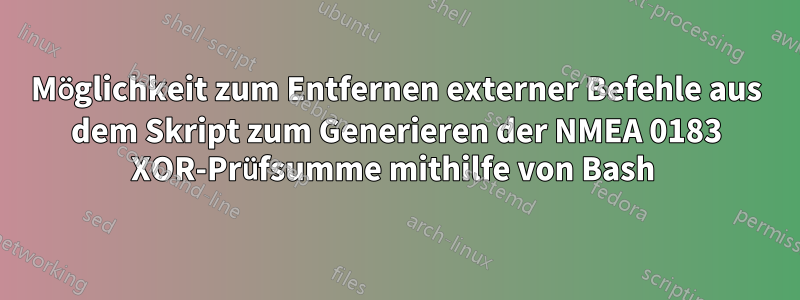
Ich musste kürzlich mit Bash NMEA 0183-Prüfsummen generieren und überprüfen, konnte aber nicht viel Geschriebenes finden, um genau das zu erreichen, was ich brauchte.
NMEA 0183-Sätze beginnen mit einem $ und enden mit einem * und zwei Zeichen, die ein Hex-XOR aller Bytes zwischen dem $ und dem * sind. Beispiel:
$INGGA,230501.547,2118.97946,N,15752.60495,W,2,08,1.1,5.17,M,,,0,0001*02
Dieses Dienstprogramm konvertiert eine Zeichenfolge in Hex und verwendet XOR. Es kann verwendet werden, um bereits vorhandene Prüfsummen zu überprüfen oder Prüfsummen für das Ende von NMEA-Sätzen zu generieren, die Sie generieren (es entfernt das $ und *.. aus den Zeichenfolgen, die Sie eingeben).
#!/bin/bash
# =========================================================
# Reads a NMEA 0183 sentence and calculates the proper
# XOR checksum for the end.
# Will accept a string with or without a checksum on
# the end or $ on the front and calculate what the checksum
# should be.
# Sentence can be read as an argument but must be single quoted
# or preceded by a \ or the shell will try to interpret the
# talker as a variable and the result will be incorrect.
# Examples:
# xor '$INHDT,207.7,T*27'
# xor \$INHDT,207.7,T*27
# xor INHDT,207.7,T
# If run with no arguments, will prompt user for data. No
# quotes or backslash is needed then.
# Depends: xxd sed
# ===T.Young 09/2016=======================================
set -o pipefail
set -o errexit
set -o nounset
# Functions
# =========
depcheck() { # Checks that necessary external commands are present
# and executable
local DEPENDS="sed xxd"
for PROG in $DEPENDS; do
[[ -x "$(command -v $PROG)" ]] || {
echo "$PROG MISSING! Exiting."
exit 0
}
done
}
x_or() { # Here is where the magic happens
# The next two lines strip out $ characters, or an
# * and anything after it (checksum)
HEAD="${SENTENCE%\**}"
TAIL="${HEAD//\$}"
# Convert ASCII string into hex and read into an array.
# Each element in the array gets preceded by "0x"
HEXVAL="$(xxd -pu <<< ${TAIL})"
HEXARRAY=($(printf '%s' "${HEXVAL%0a}" | sed -e 's/../0x& /g'))
# Loop through the array and do the xor, initially start $XOR at 0
for (( x=0; x<"${#HEXARRAY[@]}"; x++ )); do
XOR=0x$(printf '%02x' "$(( ${XOR:-0} ^ ${HEXARRAY[$x]} ))")
done
# Strip off the 0x from the result
CLEAN=${XOR#0x}
printf '%s\n' "${CLEAN^^}"
}
main() {
case "${1:-}" in
"") # No input specified, read from stdin
depcheck
read -r SENTENCE
x_or
;;
*) # Input was provided, use that
depcheck
SENTENCE="$1"
x_or
;;
esac
}
# Main
# ====
main "$@"
Beim Shell-Scripting versuche ich immer, die Verwendung externer Programme zu vermeiden, selbst so gebräuchliche wie sed oder xxd. Wenn jemand eine Möglichkeit kennt, das oben genannte nur mit integrierten Shell-Programmen zu tun, melden Sie sich bitte.
Update: Hier ist eine neue Funktion, die Satos Methode berücksichtigt. Sie ermöglicht die vollständige Eliminierung externer Programmaufrufe und der zugehörigen Depcheck-Funktion oben.
x_or() { # Create a hex XOR checksum of all the bytes
# Clean the line of $ character and anything before it
TAIL="${SENTENCE##*$}"
HEAD=${TAIL%\**}
LEN=${#HEAD}
# Loop through the string and do the xor
# initially start $XOR at 0
XOR=0
for (( x=0; x<$LEN; x++ )); do
(( XOR^=$(printf '%d' "'${HEAD:$x:1}'") ))
done
printf '%02X\n' "${XOR}"
}
Rufen Sie die Funktion mit „LC_CTYPE=C“ auf. Hier könnte man wahrscheinlich noch mehr tun, aber das ist ziemlich prägnant.
Antwort1
Ich persönlich würde es so machen:
#! /usr/bin/env bash
log() {
{
printf '%s: ' "${0##*/}"
printf "$@"
printf '\n'
} >&2
}
cksum() {
tot=${#1}
let len=tot-4
let res=0
while [ $len -gt 0 ]; do
let res^=$( LC_CTYPE=C printf '%d' "'${1:$len:1}'" )
let len--
done
let ptr=tot-2
if [ x"$( printf '%s' "${1:$ptr}" | tr a-f A-F )" != x"$( printf '%02X' $res )" ]; then
log '%s: invalid checksum (found %02X)' "$1" $res
fi
}
check () {
if expr "$2" : '\$.*\*[0-9a-fA-F][0-9a-fA-F]$' >/dev/null; then
cksum "$2"
else
log 'invalid input on line %d: %s' "$1" "$2"
fi
}
let cnt=0
if [ $# -ne 0 ]; then
while [ $# -gt 0 ]; do
let cnt++
check $cnt "$1"
shift
done
else
while read -r str; do
let cnt++
check $cnt "$str"
done
fi
Die Shebang-Zeile behauptet bash, sollte aber trotzdem für ksh93rund funktionieren zsh. Keine Abhängigkeit von xxd. Auch kein Anspruch, ein Beispiel für einen zu befolgenden Skriptstil zu sein. :)


